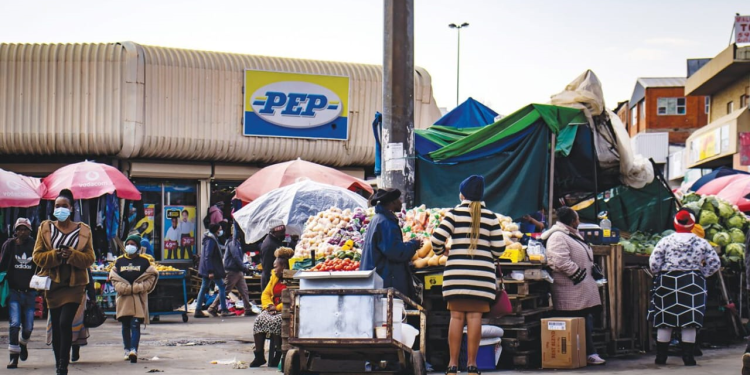Maseru
Local Basotho-owned Small, Medium, and Micro-sized Enterprises (SMMEs) in Lesotho are facing an uphill battle for survival, with allegations surfacing that the government is failing to address their plight. The impasse revolves around the enactment of the Business Licensing and Registration Act 2019, which reserves certain SMME activities exclusively for Basotho nationals, prohibiting foreign nationals from operating in these sectors.
Section 34 of the Act designates over 40 businesses exclusively for Basotho ownership and operation. These activities span various sectors including transportation, real estate, retail, tourism. Despite these legal provisions, trade unions advocating for the rights and interests of local traders express growing frustration over the apparent lack of enforcement by the government.
Other businesses which the foreigners cannot venture in according to the act, are medical goods and chemicals, retail of bread and confectionery products, retail sale of motor vehicle parts and accessories, repairs of motor vehicles parts including vehicle tyres and motorcycle parts, retail sale, maintenance and repair of motorcycles and related parts and accessories.
In an Interview with the Weekly Observer during the week, according to Motseki Nkeane, president of the Lesotho Liquor and Restaurants Owners Association (LLROA), the government’s enforcement of the Act has been sluggish. Nkeane alleges that Minister of Trade, Industry, and Business Development, Honourable Mokhethi Shelile, has referred to the Act as “controversial,” delaying its full implementation due to concerns over international relations.
In light of all these findings, he told this publication that they will now seek other measures to remedy the situation should it persist.
“All these is just delay tactics, we were informed that on April 17, all associated the ministries will be convened to pave a way forward. Failing which, we are ready to strike because even the courts of law are now playing hide and seek with us, they keep postponing our matter but we will get to the bottom of it,” he said.
Nkeane further revealed that the Act, which was gazetted in 2019 and reinforced in 2020, was intended to force foreign traders to vacate reserved businesses by August 2023. However, as of the present, many foreign-owned enterprises continue to operate in contravention of the law.
“On 1 August 2023, they (foreigners) were supposed to have left such businesses, nothing has changed. Mr Molapo had clarified in one of those regulations, licenses which were to be renewed would not be renewed within that period and new ones were not supposed to be issued but none of this has come to fruition,” the President continued.
According to reports, the situation is exacerbated by the dominance of foreign-owned supermarkets and businesses, particularly those owned by Chinese nationals, who often offer lower prices due to quantity discounts. Remi Mabathoana, Secretary General of Thibella Zone Vendors Association, highlights the struggle faced by local traders who find it difficult to compete with foreign entities, especially in an economy plagued by inflation.
“For instance, when I buy 1kg of a sugar pack, I divide it into smaller plastics so that I can sell more quantities it. Lately the Chinese are doing so too but at cheaper process compared to ours and we do not make much sales. We have been suffering for a long time now, I wish the government can come to our rescue,” she complained.
Responding to these allegations, Liahelo Nkaota, Public Relations Officer in the Ministry of Trade, Industry, and Business Development, claimed the government is committed to addressing compliance issues within the business sector. Assuring that the Ministry is actively overseeing adherence to the law, urging the public to report any violations.
Furthermore, Nkaota outlined efforts to address the longstanding issue, including the formation of a task team comprising private sector representatives. This team has conducted research, including a study tour to Botswana to understand similar legislative frameworks, with the aim of providing recommendations for effective implementation by May.
“It is an offence for a foreigner to sell such products more especially with that quantity because the law stipulates strictly that they should be for Basotho. We had a similar case sometime in the Butha-Buthe district, there was an outcry and we went there to inspect.
We found the infringement to be true and as a result, offenders were rebuked. Ever since then we haven’t received such cases only rumours. So in these cases, I would urge the public to report so that we can help them,” she said.
Nkaota assured that advanced strides have been made to address this long-standing issue in a manner that will not stain Lesotho’s business community.
“We have formed a task team comprising of the private sector. They discussed on various ways on how they can activate this section. The even went on a study tour to Botswana to learn how they enacted the law, the team is still active and the expectation is that by May, they would have completed all their research and would advise on how to deploy the regulation,” Nkaota said.
However, despite these assurances, the plight of local SMMEs remains precarious, with stakeholders calling for urgent action to safeguard the interests of Basotho-owned businesses. As tensions escalate, there are hints of potential strikes if the government fails to deliver on its promises, underscoring the urgency of the situation for Lesotho’s economy and its entrepreneurial landscape.






